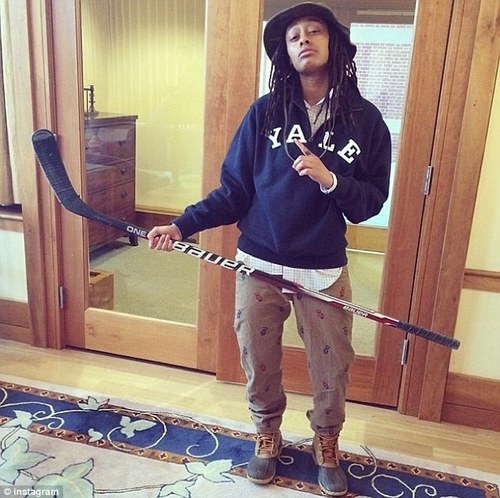
Earlier this year, I posted a photo of myself dressed in a Yale sweatshirt, embroidered pants, L.L. Bean boots and a hockey stick to my personal Instagram account. I captioned it “Lawrenceville Boi” (boi being a word used in the queer community to describe butch lesbians) and added hashtags like #confederate, #romney2016, #peakedinhighschool, #nwa and #ilikerap. The photo stirred up controversy at the elite private boarding school in New Jersey I attended at the time, where I was also student body president. I was told by my school’s administration and some students that I had offended a large portion of the school’s population, and I would have to either step down as student body president of The Lawrenceville School or face disciplinary action for the photo. I resigned in March.
Since then, I’ve been accused of trying to bring Lawrenceville down. While I understand how people might get that impression, it couldn’t be further from the truth. In fact, I love Lawrenceville so much that I refuse to stand by while the pressures of systematic oppression that plague our entire country go to work at the school I once called home. I consider Lawrenceville a microcosm of the United States, where discrimination and racism must be addressed.
Let me say first that the photo was strictly satirical. Earlier in the year, my friends and I had taken a Black Power photo for the yearbook, with our fists raised, that caused some backlash on campus. Because of that backlash, we decided to take another photo for our other yearbook page in which we all wore “typical Lawrenceville” apparel. That’s where the offending photo originated from.
As student body president, and Lawrenceville’s first black woman to hold the position, my actions were undoubtedly immature. But I hold firm that the use of satire to bring light to issues is not only effective, but also sometimes necessary when coping with oppression and injustice.
I was never called a nigger at Lawrenceville. Once a faggot. A few times a dyke. A trans friend was once called a “tranny” and a cross-dresser. The majority of the discrimination at Lawrenceville is subtle, almost unnoticeable unless you really pay attention to the anti-minority sentiments that linger in the minds and show themselves in the words of a few vocal Lawrentians.
It’s unclear to me where the insensitive, anti-PC attitude that I see so often in Lawrenceville men (women as well, but men in particular) comes from, though it’s certainly not exclusive to my alma mater. But I’m invested in changing such attitudes on campus and among the student body because Lawrenceville is the place where I gained the majority of my knowledge. Without the help of the school and the faculty, I probably wouldn’t have been able to write this piece. Though the educational value of Lawrenceville is priceless (the price tag, on the other hand, is $70,000 a year), there’s a crucial lack of appreciation for peoples and cultures that don’t fit the traditional American norm.
Lawrenceville preaches its own diversity, but the student body is predominantly white. From my observations, African Americans and Latinos make up a small portion of the student body. Lawrenceville was created for the children of wealthy, white, Protestants. In its 200-some years, Lawrenceville’s student body has included students of color for only around half a century, and women for only a quarter. Lawrenceville is also focused on honoring tradition. In the late 19th Century, the Southern Club was advertised in the yearbook with a caricature of an African American man. Last year, a Confederate flag was used at the club fair. It’s important to remember Lawrenceville’s history with pride, but modern Lawrentians and school administrators must understand that that history was not kind to all people.
Progress at Lawrenceville can be as simple as a more diversified curriculum or a non-gendered dress code. It will require overriding some traditions and ensuring minority students the same safety and comfort (physical and emotional) as the traditional Lawrenceville boy. I say this with full confidence that Lawrenceville will progress. I say this with gratitude for every person I have met and everything I have learned on the school’s stunning campus.
To the young women, students of color, disabled students, queer students, students who aren’t wealthy and straight white men who understand the plight of minorities who may be considering Lawrenceville: Don’t allow the recent articles and my story to dissuade you from attending. Although I don’t believe Lawrenceville knew how to effectively deal with me as a queer woman of color and as another brash teen, I owe all that I am to the school, the teachers who influenced and supported me and the amazing friends that I made. Lawrenceville needs your voices and your strength. There is a lot of work to be done, and we have to do it together.
(Note: Lawrenceville’s response to the controversy is here.)
Maya Peterson is a poet, rapper and activist. She will be a freshman at Wesleyan University pursuing a degree in Creative Writing and Sociology.
More Must-Reads from TIME
- Donald Trump Is TIME's 2024 Person of the Year
- Why We Chose Trump as Person of the Year
- Is Intermittent Fasting Good or Bad for You?
- The 100 Must-Read Books of 2024
- The 20 Best Christmas TV Episodes
- Column: If Optimism Feels Ridiculous Now, Try Hope
- The Future of Climate Action Is Trade Policy
- Merle Bombardieri Is Helping People Make the Baby Decision
Contact us at letters@time.com